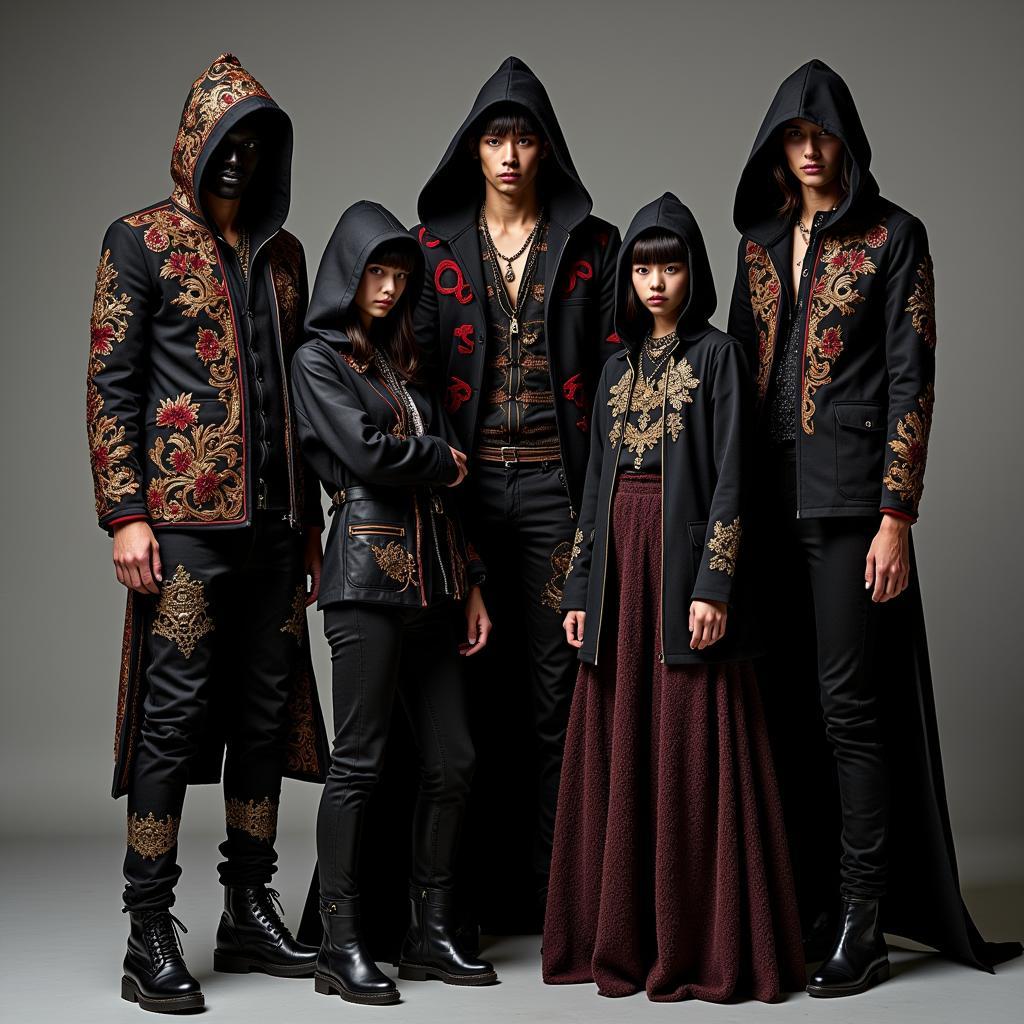The term “Secret Society Clothing” often evokes an air of intrigue and mystery. It hints at hidden worlds and exclusive groups, adorned in garments imbued with symbolism and meaning. But what exactly constitutes “secret society clothing,” and what drives the fascination with these enigmatic ensembles?
Delving into the Shadows: History and Origins
The concept of secret societies wearing distinctive clothing dates back centuries. From ancient religious orders to medieval guilds, groups have long utilized clothing to signify membership, rank, and shared beliefs. These garments often served practical purposes, like identifying fellow members in crowded spaces or during times of conflict. However, they also played a crucial role in reinforcing group identity and fostering a sense of belonging.
One notable example is the Freemasons, a fraternal organization with roots in medieval stonemasons’ guilds. Freemasons are known for their elaborate rituals and use of symbolism, which extends to their clothing. The iconic Masonic apron, worn during lodge meetings, is a potent symbol of membership and carries layers of esoteric meaning.
Beyond the Veil: Symbolism and Significance
The allure of “secret society clothing” often lies in its hidden meanings. Symbols, colors, and even the way garments are worn can communicate complex ideas and affiliations. For those outside the group, these symbols can spark curiosity and speculation, adding to the air of mystery surrounding the society.
Consider the Ku Klux Klan, a white supremacist hate group. Their infamous white robes and pointed hoods are instantly recognizable and serve as chilling symbols of terror and intimidation. While reprehensible, the Klan’s use of clothing demonstrates the power of garments to project an image and elicit a visceral response.
Navigating the Labyrinth: Separating Fact from Fiction
The internet is awash in images and stories about “secret society clothing,” but it’s crucial to approach this topic with a critical eye. The line between genuine historical artifacts and modern interpretations can be blurry. Sensationalized accounts and conspiracy theories often overshadow factual information, making it challenging to discern truth from fabrication.
Furthermore, it’s essential to remember that not all groups that utilize distinctive clothing are necessarily “secret societies” in the traditional sense. Subcultures, social clubs, and even some professional organizations incorporate unique clothing styles as part of their identity, without necessarily engaging in secrecy or clandestine activities.
Secret Society Clothing Today: From Subculture to Style?
In contemporary society, the lines between “secret society clothing” and mainstream fashion are becoming increasingly blurred. Designers often draw inspiration from historical and subcultural clothing styles, incorporating elements of symbolism and mystique into their collections. This appropriation of “secret society” aesthetics has sparked debate, with some arguing it trivializes the original meanings and significance of these garments.
 Modern Interpretations of Secret Society Clothing
Modern Interpretations of Secret Society Clothing
It’s important to approach the topic of “secret society clothing” with sensitivity and respect. While the allure of the unknown can be captivating, it’s crucial to avoid perpetuating harmful stereotypes or spreading misinformation. By engaging in thoughtful research and critical analysis, we can appreciate the historical and cultural significance of these garments while acknowledging the complexities surrounding their use and interpretation.
FAQ: Unraveling Common Questions About Secret Society Clothing
-
Is it legal to wear “secret society clothing” even if you’re not a member? Generally, yes. However, it’s important to consider the context and potential implications. Wearing certain symbols or garments associated with hate groups, for example, could have legal ramifications or incite violence.
-
Can you buy authentic “secret society clothing”? Authentic historical artifacts are rare and often found in museums or private collections. While replicas and modern interpretations are readily available, it’s crucial to be wary of sellers claiming to offer genuine historical pieces.
-
Do all “secret societies” still exist today? The existence and activities of modern-day “secret societies” are often shrouded in secrecy and speculation. While some historical groups continue to operate, it’s difficult to ascertain their current status and influence.
Seeking Further Insight?
For those interested in learning more about secret societies and their cultural impact, numerous resources are available. Explore our website for additional articles on related topics, such as:
Remember, knowledge is key to understanding the complexities of our world and fostering a more peaceful and inclusive society.
Need Assistance?
If you or someone you know requires support related to extremism, discrimination, or other forms of injustice, please reach out. Our team at Society For Peace is here to help:
Phone: 02043854663
Email: [email protected]
Address: Khu 34, Bắc Giang, 260000, Việt Nam
We have a dedicated team available 24/7 to provide assistance and guidance.